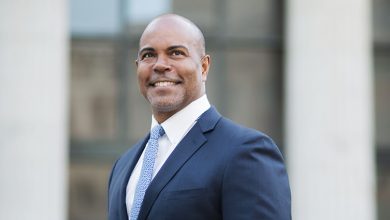Millennials Listen Intently as Candidates Debate Health Care
By William J. Ford
Camara Stokes Hudson raised her arms in the air and clapped when Sen. Elizabeth Warren of Massachusetts said the country should provide universal child care and universal pre-kindergarten, especially to help single, working mothers.
Stokes Hudson, 24, who will attend law school at NYU this month, also heard and noticed three items in Tuesday’s Democratic presidential debate that didn’t receive as much discussion: race, the ongoing water crisis in Flint, Michigan, and all the people of color candidates who didn’t appear on stage.
“This is one of the most diverse, presidential Democratic fields we’ve ever had. It would’ve been nice to see that diversity across the stage on both nights,” said Stokes Hudson, who graduated in 2013 from The School Without Walls High School in Northeast. “I didn’t understand the small portion of race discussed and to not talk about Flint [more] when the debates are in Detroit and in the same state.”
Stokes Hudson and other young adults with Black Youth Vote! hosted a debate watch party at Halfsmoke in Northwest on Tuesday, July 30 — the first of two nights for Round Two of the Democratic presidential debates, this time held not in Miami but Motown. The coalition of individuals ages 18 to 35 seeks to increase civic engagement and voter participation as part of a program managed by the National Coalition on Black Civic Participation.
Other Black Youth Vote! groups held watch parties in Alabama, Florida and Georgia.
Those who came to the restaurant listened and watched the exchanges between the moderate and progressive candidates for the two hour-debates televised on CNN. Approximately 25 people seek the Democratic nomination with the winner more than likely to face Republican President Donald Trump in next year’s general election.
Besides Warren, the other nine candidates featured author Marianne Williamson; Rep. Tim Ryan of Ohio; Sens. Amy Klobuchar of Minnesota and Bernie Sanders of Vermont; Montana Gov. Steve Bullock; South Bend, Indiana, Mayor Pete Buttigieg; former Reps. John Delaney of Maryland and Beto O’Rourke of Texas; and former Colorado Gov. John Hickenlooper.
A few feisty moments came when Sanders responded to a question about union members who may prefer to keep their current health insurance versus Medicare for All plan.
When Sanders said the plan will be better, Ryan responded “You don’t know that, Bernie.”
“I do know, I wrote the damn bill,” Sanders said.
Williamson, the first candidate to talk about reparations, responded to a question about it Tuesday.
“We need to recognize, when it comes to the economic gap between Blacks and whites in America, it does come from a great injustice that has never been dealt with,” she said. “That great injustice has had to do with the fact that there were 250 years of slavery followed by another 100 years of domestic terrorism.”
Several of those at the debate watch party such as Karrine Williams, who graduated last year from Temple University in Philadelphia, said it’s still too early to choose a particular candidate. When asked if any of the candidates’ statements stood, she said, “not really.”
Meanwhile, Wednesday’s debate highlighted the higher profile candidates that included former Vice President Joe Biden; Sens. Cory Booker of New Jersey, Kirsten Gillibrand of New York, Kamala Harris of California and Michael Bennet of Colorado; Rep. Tulsi Gabbard of Hawaii; New York City Mayor Bill de Blasio; Washington Gov. Jay Inslee; former President Barack Obama official Julián Castro; and tech entrepreneur Andrew Yang.
Although Rep. Eric Swalwell of California participated in the first round of debates in June, he has since dropped out of the race.
The five other candidates — former Alaska Sen. Mike Gravel; Rep. Seth Moulton of Massachusetts; Wayne Messam, mayor of Miramar, Florida; Joe Sestak, a retired Navy admiral; and billionaire Tom Steyer — didn’t qualify because they needed 65,000 donors to their campaigns, or did not obtain at least 1 percent in three polls recognized as legitimate by the Democratic National Committee.
The two days of debates held in Detroit came a week after the NAACP hosted its annual convention there as well where delegates voted on a resolution for the House to call for Trump’s impeachment.
Jaedon Mason, 20, said Trump’s presidency has produced plenty of emotion from both critics and supporters.
“It’s made politics more mainstream — something I’ve never seen before,” said Mason, a rising junior at American University in Northwest.
“There’s a quote from one of my favorite shows, ‘The West Wing’ — “Government should be a place where people come together.” This idea that we are disenfranchised by our government is bad and … a legitimate fear that people have. One of the best ways to combat that is to participate and to vote.”
This post originally appeared in The Washington Informer.

